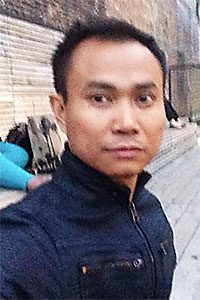
Today, the government is making the best out of Valentine's Day. It will kick off a mission to forge, and force, love and unity upon those who are part of the decade-long political divide. To heal the pain, bridge the differences and move on, the regime has unsurprisingly resorted to a top-down military style of work.
First of all, politicians from different parties will be marched in alphabetical order, one by one, to share their views on national unity with a government committee on the topic starting today. This is to avoid allegations of preferential treatment, said Deputy Prime Minister Prawit Wongsuwon who chairs the panel. A very orderly arrangement, indeed.
But debates and arguments will not be allowed during these hearing sessions. Politicians are required to share their thoughts and frame them around 10 topics predetermined by the committee. Lastly, this task must be completed within three months. A highly demanding timeline.
If I were a politician lined up in alphabetical order to give my views, I would just go there out of courtesy and offer whatever thoughts I had, and then call it a day.

Surasak Glahan is deputy oped pages editor, Bangkok Post.
And if I were a relative of those killed or injured during the political violence, I would feel bitter about being barred from bringing up any comments on injustice. But they have not been invited to these sessions anyway.
To be fair, one should not blame the military if this mission is not a successful one as it is a pursuit that many previous governments have also failed to pull off.
But it is about time that the regime makes this reconciliation effort a more conclusive and open platform. It should shift away from handling matters in its own way, and recognise that the military is not the most experienced institution when it comes to healing political differences.
The process should have been facilitated by more neutral parties and the committee should have been run by members of various sides of the political conflict, including those who have been affected by them. Disappointingly, the reconciliation panel is made up of politicians and academics who seem to have leaned toward one political group in the past conflict, the now-defunct People's Democratic Reform Committee.
People from all walks of life have either been affected or disappointed by what happened to the country's politics and the rule of law. The reconciliation team should try the approach of a shrink who treats patients by firstly letting them speak to release pain, frustration, bitterness, anger and disappointment about things that may not fall within the 10 topics.
The regime should also not be worried about clashes of ideas, and let debates take place afterwards. Allowing discussions and arguments does not mean everybody can make unrealistic demands. It's a hearing process that would allow disaffected people to reach closure and help the panel understand the bigger picture.
Some facts may be hard to swallow but the regime has to take it as it is all part of the political conflict. But Gen Prawit has brushed aside that notion. He may forget that, in addition to numerous coups, the army also staged bloody crackdowns on political protesters, notably the deadly 2010 operations to end the prolonged red-shirt street protests that resulted in about 100 fatalities.
More importantly, reconciliation cannot be expected to bear fruit within the short time frame stipulated. Rather, the government should let this process evolve in its own time, without setting a tight deadline and tying it to the regime's roadmap to democracy, which is impractical. Doubts also linger whether the regime plans to stay in power longer to complete the mission if the deadline is not met.
To forge reconciliation, Gen Prawit and his team need to foster a more enabling environment for people to air their views. It may be a tough decision to make, but the government must consider lifting the ban on political gatherings, stop intimidating dissidents, and start dropping existing charges and prosecutions against its critics.
I'm not positive about this mission at all, because Prime Minister Prayut Chan-o-cha has made a rare plea to those who have different opinions to not offer rebukes, but only what he believes are constructive suggestions.
His reconciliation team will not be short of suggestions if it lets people speak freely. Handling reconciliation in a military style with a panel dominated by generals and those with partial views will only result in something short-lived.
